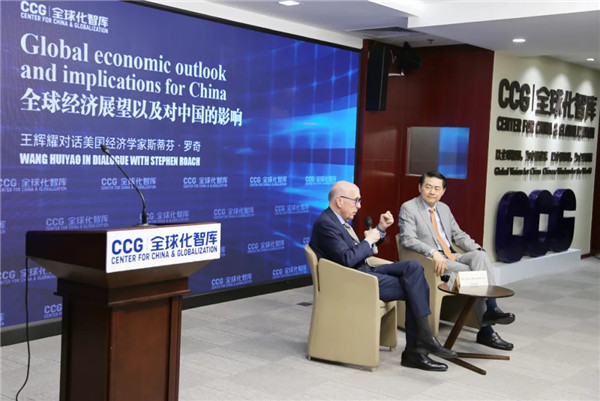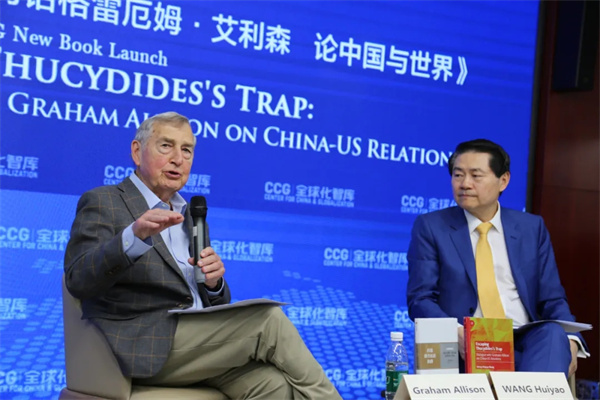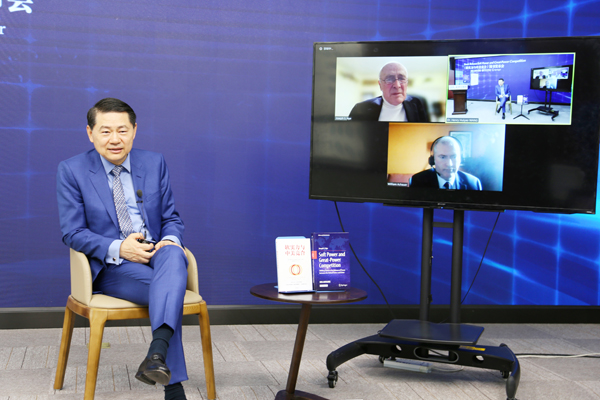Professor Woo offers a fresh perspective on the roots and remedies for Sino-US trade tensions
UC Davis Professor of Economics highlights structural concerns underlying current frictions

On July 5, just a day before proposed tariffs from Washington and Beijing were slated to go into effect, Professor Wing Thye Woo gave a presentation at CCG HQ in Beijing offering new perspectives on the roots and resolutions for the conflict. Amidst ongoing Sino-US trade tensions, this was the latest in a series of events that CCG has held to share different views on the topic, aid mutual understanding, and promote discussion of potential policy solutions. Woo is currently Professor of Economics at the University of California Davis and a CCG academic advisor. He is also President of the Malaysian think tank Jeffrey Cheah Institute on Southeast Asia and Director of the Jeffrey Sachs Center on Sustainable Development at Sunway University in Malaysia.
While recent trade actions have been brought to a head by the current US administration and its particular approach to trade policy, Professor Woo argues that the underlying US concerns which fuel discomfort with China’s rise are structural and have been present for some time. He groups these concerns under three broad issues, namely jobs, technology, and national security.
Previously, no single one of these three issues has been enough to precipitate a trade war and the need for post-9-11 cooperation help to keep the bilateral relationship on a steady track. However, Woo pointed out that there have always been competing views of China in Washington, with different camps seeing Beijing as predominantly a strategic competitor or an economic partner respectively. Previously, those favoring engagement and cooperation, supported by US business interests, have shaped policymaking towards China. However, following President Trump’s election, hawkish voices now hold the upper hand. Woo argues that this is not just due to shifts in US domestic politics but is also a reflection of a new emerging geopolitical landscape in which US relative power is diminished, increasing the salience of national security concerns in Washington.

In this new multipolar world, Woo argues that there will be no true global hegemon but rather dominant regional powers. As spheres of influence increasingly overlap, Woo expects that conflicts of interest will be more common and trade wars more frequent. Given this trajectory of geopolitics, Woo argues that durable peace and prosperity depends on China’s ability to work with other countries to protect multilateral regimes such as the WTO.
In the second half of his talk, Woo expanded on the three US concerns driving a harder line towards China and suggested potential ways to address these issues.
First is the perception that China is stealing jobs from the US. Woo argues that claims that RMB currency appreciation can help to bring jobs back to the US are based on flawed assumptions about the world economy. Rather, the trade deficit is a result of various deeper structural factors on both sides. Therefore, he suggests that US policymakers should abandon the mantra of RMB appreciation and instead address structural factors that contribute to imbalance. On the Chinese side, Woo suggests that China should continue to open its economy and reform factor markets, address structural issues that result in a high savings rate and large purchases of US treasury bills, and liberalize the financial sector to promote RMB internationalization.
Secondly, some in the US claim that China is stealing technology. Professor Woo argues that what US commentators sometimes refer to as “forced technology transfer” can actually be characterized as a “willing-buyer, willing-seller transaction” in which China uses its market power for advantage in negotiations, in much the same way that Walmart negotiates bulk buy discounts from suppliers. Woo notes that there is increasing pushback against this tactic by MNCs as China moves towards the technology frontier and predicts that other G7 nations may club together in opposing it. Woo suggests that China should wind down the use of the JV model and subsidies as tools of industrial policy, instead focusing on building domestic R&D capabilities. In addition to allaying foreign concerns, Woo argues that this is in China’s interest to nurture indigenous innovation and reduce industrial overcapacity.
Turning to the third concern, national security, Professor Woo notes that this is increasingly seen as linked to economic strength and predicts that trade will increasingly become weaponized in a multipolar world. He says that continued economic growth will depend on leading regional powers having a sense of national security, as the international coordination needed to support the multilateral trading system can only be achieved when the national security interests of leading regional powers are satisfied. For the US, Woo sees part of the answer as reform of CFIUS so it can better protect national interests, with broad and comprehensive oversight but also a clearly defined scope so that it is operationally viable. Woo suggests that China could also adopt an equivalent of CFIUS that is clear and transparent.

Following the presentation, CCG President Dr. Wang Huiyao also shared some views on Sino-US relations. He argued that a narrow focus on the trade deficit ignores many important components of the economic relationship that benefit the US, such as trade in services and profits of US MNCs in China. Dr. Wang outlined promising areas of cooperation that could help set the relationship on a more positive track, including increasing Chinese imports of US energy products and cooperation on President Trump’s infrastructure plan.

Larry Li, Vice President of US-China Policy Foundation, also gave comments. He pointed out that there is little chance of US gaining manufacturing jobs back from China, as such operations are already relocating to cheaper countries in South East Asia since China’s “population dividend” ended around 2012. He also supported Professor Woo’s call for more investment in education and R&D to help improve China’s competitiveness.





